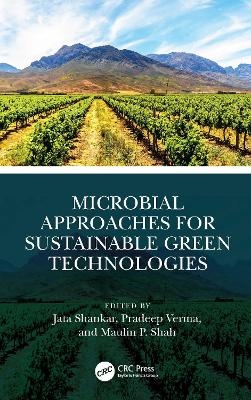
Microbial Approaches for Sustainable Green Technologies
CRC Press (Verlag)
978-1-032-52648-5 (ISBN)
Microbial systems have a strong potential to develop green and sustainable technologies, including sources of renewable energy, alternative fuels, and biosynthetic materials for sustainable applications. Advances in these technologies are evolving to meet growing demand and industries are adapting to green technologies such as solar panels, bioethanol, hydroponics, and more. With the aid of sophisticated technology and integration strategies, these industries are moving toward being more environmentally friendly and sustainable. This book serves as a guide to the newest technologies that will enable the implementation of microbial technologies in fostering an eco-friendly industrial and environmental landscape, which will have widely positive impacts for generations to come.
Provides recent insights on diverse technologies involved in green technologies
Explains the application of microbes via fungi to remediate pollutants and examines the latest treatment technologies in bioleaching and electronic waste treatment
Provides updated information on bioenergy and flexible fungal materials as alternatives to plastics
Discusses the application of IOT and communication electronics in the development of green technologies
Prof. Jata Shankar, Ph.D., M.S., is a distinguished academician and researcher serving as a Professor in the Department of Biotechnology and Bioinformatics at Jaypee University of Information Technology, Waknaghat Solan, India. His academic journey includes earning a Ph.D. from the Institute of Genomics and Integrative Biology-Council of Scientific and Industrial Research in association with the Department of Biosciences, Jamia Millia Islamia, New Delhi, India. Notably, he pursued a postdoctoral fellowship at Stanford University, USA, and received additional postdoctoral support from an NIH-USA grant while working under mentorship with Prof. David A Stevens. His mentorship extends to guiding five Ph.D. scholars, 40 B.Tech project theses, and 10 M.S. project theses. His research outputs include the submission of several hundred partial gene sequences to GenBank, substantial Next Generation Sequencing SRA-data, and a notable presence in protein databases. With over 50 peer-reviewed articles, including book chapters, and more than 10 as a lead author, Dr. Shankar is passionately involved in mentoring students to help them achieve their career goals. His multifaceted contributions underscore his commitment to advancing knowledge in biotechnology and bioinformatics. Prof. Pradeep Verma completed his Ph.D at Sardar Patel University Gujarat, India in 2002. In the same year, he was selected as UNESCO Fellow and joined the Czech Academy of Sciences in Prague, Czech Republic. He later moved to Charles University, Prague to work as Post-Doctoral Fellow. In 2004, he joined the UFZ Centre for Environmental Research, Halle, Germany as a visiting scientist. He was awarded a DFG fellowship which provided him another opportunity to work as a Post-Doctoral Fellow at Gottingen University, Germany. He is also a recipient of various prestigious awards such as the Ron Cockcroft award by Swedish society and UNESCO Fellow ASCR, Prague. He has been awarded Fellow of the Mycological Society of India (MSI-2020); the Prof. P.C. Jain Memorial Award, Mycological Society of India 2020; and Fellow of the Biotech Research Society, India (2021). He is currently working as the Professor (former head and dean, the School of Life Sciences) at the Department of Microbiology, CURAJ. He is a member of various national and international societies and academies. He has completed two collaborated projects worth 150 million INR in microbial diversity and bioenergy. Dr. Maulin P. Shah has been an active researcher and scientific writer in his field for over 20 years. He received a B.Sc. degree (1999) in Microbiology from Gujarat University, Godhra (Gujarat), India. He also earned his Ph.D. degree (2005) in Environmental Microbiology from Sardar Patel University, Vallabh Vidyanagar (Gujarat), India. His research interests include Biological Wastewater Treatment, Environmental Microbiology, Biodegradation, Bioremediation, and Phytoremediation of Environmental Pollutants from Industrial Wastewaters. He has published more than 240 research papers in national and international journals of repute on various aspects of microbial biodegradation and bioremediation of environmental pollutants. He is the editor of 65 books of international repute.
Chapter 1 Microbial Sensors: A Tool for Accelerating Sustainable Green Technologies
Chapter 2 Biosensors: Role and Application in Green Technologies
Chapter 3 Microorganism-Mediated Microplastic Degradation Methods and Mechanism
Chapter 4 Applications of Microbial Biosurfactants in Oil Recovery
Chapter 5 Omics Strategies Targeting Microbes with Microplastic Detection and Biodegradation Properties
Chapter 6 Application of Bioinformatics: Integrated Computational Tools in Green Technologies
Chapter 7 Exploring the Next-Generation Polymers: Synthesis and Emerging Applications of UHMW Protein Polymers
Chapter 8 Flexible Fungal Materials: An Industrial Perspective
Chapter 9 Fungal Biocontrol Agents to Control and Management of Diseases in Cropsas Biocontrol Agents for Sustainable Development
Chapter 11 Potential of Extremophilic and Native Microbial Consortia in the Bioleaching of Heavy Metals on Mining Process
Chapter 12 Bioprospecting and Exploration of Extremophilic Enzymes in Bioremediation of Wastewater Polluted
Chapter 13 Exploration of Microbial Enzymes in Bioremediation
Chapter 14 Exploration of Microbial Hydrolases for Bioremediation
Chapter 15 Secondary Metabolites in Green Synthesis of Nanoparticles
Chapter 16 Mushroom Cultivation and Application in Green Technology
Chapter 17 Yeast System as Biofuel
| Erscheinungsdatum | 03.05.2024 |
|---|---|
| Zusatzinfo | 26 Tables, black and white; 35 Line drawings, black and white; 14 Halftones, black and white; 49 Illustrations, black and white |
| Verlagsort | London |
| Sprache | englisch |
| Maße | 156 x 234 mm |
| Gewicht | 453 g |
| Themenwelt | Naturwissenschaften ► Geowissenschaften ► Hydrologie / Ozeanografie |
| Technik ► Bauwesen | |
| Technik ► Elektrotechnik / Energietechnik | |
| Technik ► Umwelttechnik / Biotechnologie | |
| ISBN-10 | 1-032-52648-3 / 1032526483 |
| ISBN-13 | 978-1-032-52648-5 / 9781032526485 |
| Zustand | Neuware |
| Informationen gemäß Produktsicherheitsverordnung (GPSR) | |
| Haben Sie eine Frage zum Produkt? |
aus dem Bereich


